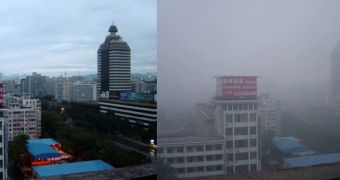City officials in Beijing recently admitted that the pollution situation in the city was absolutely critical. They said that the foul smog that enveloped the city around the year only cleared when massive storms stroke, and added that something should be done this year about this. Mayor Guo Jinlong said during the opening session of the city's parliament that the number of “blue sky days” scheduled for this year would most likely be lower than the one for 2009. The increase in pollution is largely due to the fact that more and more people of the 17 million living in the Chinese capital are buying private cars, Reuters reports.
Beijing is also a very powerful industrial center in the Asian nation, and its factories contribute to the level of pollution considerably. In addition, most of the energy in use in the city is obtained from burning fossil fuels such as coal in power plants nearby. “The problems between population, resources and the environment are extremely serious,” Guo told the assembly. There were pledges by the Chinese authorities to start alleviating this problem, by building new bus lanes in the city, as well as additional subway lines, but these plans have thus far remained only theoretical.
“We will control the total quantity of pollutants generated and undertake trial reforms in the trade of pollution discharge rights. We will deepen the development strategy of giving priority for public transportation, and build a green commuting system that gives priority to rail transit and emphasizes surface public transportation,” the mayor added. The official also said that about 73 percent of all days in 2010 should be managed in a way that would allow for them to be cataloged as “blue sky.” This implies that the quality of air in the city is deemed either excellent or fairly good. In practice, this means about 266 days, a considerable drop from the 285 days that were considered “blue sky” in 2009.
International attention on the situation was first drawn ahead of the Olympic Games that were scheduled to take place in the Chinese capital. Central authorities at the time closed down the most polluting factories, and created a certain schedule under which private cars were allowed to circulate the capital's streets. But these measures proved to be insufficient, as the city is still periodically engulfed by smoke. The goal that Guo wants to accomplish is to turn Beijing in a “global city,” which means that pollution and smog have no room in the skies above.

 14 DAY TRIAL //
14 DAY TRIAL //